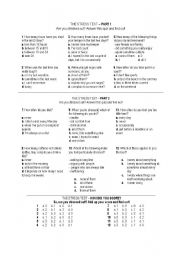
You can also use Learning Center coaching appointments to help you create a study schedule and remain accountable. Use one of the Learning Center’s weekly calendars to make a schedule. Space your studying out into smaller chunks over time. Start studying a few weeks in advance so that you have enough time to prepare for your test.
#ANXIETY QUIZ FOR KIDS HOW TO#
How to reduce test anxiety Well before the examīe prepared. Make sure to take the time to recognize when you have worked hard and allow yourself to make mistakes. If you struggle with perfectionism, try to let it go. Research studies show that students who have high perfectionism and high self-criticism tend to have high test anxiety and do worse on exams. Perfectionism is having extremely high performance expectations for yourself. If you need a certain grade to pass the class, it could increase your test anxiety. It is important to remember to stay in the present moment when taking an exam so you remain focused. Not succeeding on the previous exam can make you anxious for the next exam. Waiting until the last minute or not studying at all can leave you feeling anxious and overwhelmed. While the pressure of doing well on an exam can be motivating, it can be detrimental to your self worth if you associate the grade of the test with your value. Test anxiety can also cause panic attacks, which are the abrupt onset of intense fear or discomfort in which you may feel like you are unable to breathe or like you are having a heart attack.Įmotional symptoms: Feelings of stress, fear, helplessness, and disappointment, negative thoughts (rumination about past poor performances, consequences of failure, feeling inadequate, helpless), mind going blank, and racing thoughts.īehavioral/cognitive symptoms: Difficulty concentrating, thinking negatively, comparing yourself to others, and procrastinating. Physical symptoms: Headache, nausea, excessive sweating, shortness of breath, rapid heartbeat, lightheadedness, and feeling faint. Test anxiety might look different from student to student, but the following is a list of possible symptoms you might experience: If you’re someone who does, check out these suggestions and resources to reduce your text anxiety and improve your overall testing experience in college. Many students experience varying levels of test anxiety for a number of difference reasons.

Test anxiety is a combination of physical symptoms and emotional reactions that interfere with your ability to perform well on tests.

Anxiety can be problematic when it prevents you from taking or doing your best on an exam, causes you to feel anxious all the time, or becomes extreme. However, extreme feelings of anxiety and stress before and during an exam can have unhealthy results. Feeling nervous for exams is a normal feeling among college students.


 0 kommentar(er)
0 kommentar(er)
